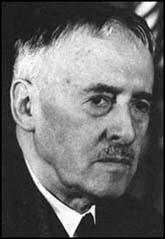Henry L. Stimson

Henry Lewis Stimson was born in New York City on 21st September, 1867. After attending Phillips Andover Academy he graduated from Yale University in 1888. He also studied at Harvard Law School before becoming a lawyer.
In 1906 Theodore Roosevelt appointed him as a US District Attorney for the Southern District of New York. He also served as Secretary of War under President William Taft (1911-13).
A member of the New York National Guard (1898-1907) Stimson served in the United States Army in the First World War. Stimson served as a lieutenant colonel in France before being promoted to command the 31st Field Artillery.
A member of the Republican Party, Stimson was appointed by Calvin Coolidge as Governor of General of the Philippines (1927-29) and served as Secretary of State under Herbert Hoover (1929-33). Stimson left public office when the Democratic Party candidate, Franklin D. Roosevelt, was elected president in 1933.
Stimson wrote extensively about foreign affairs and books published by him include American Policy in Nicaragua (1927), Democracy and Nationalism in Europe (1934) and The Far East Crisis (1936).
On the outbreak of war in Europe in 1939, Stimson was an outspoken advocate of support for the Allies against Nazi Germany. In an attempt to gain political unity for his policies Franklin D. Roosevelt appointed Stimson, a prominent member of the Republican Party, as Secretary of War in his Democratic Party administration.
After the United States entered the Second World War in December, 1941, Stimson, who was now 74 years old, energetically organized America's industrial and economic resources in the fight against Japan and Germany.
When the Allies gained the upper hand in 1944 Stimson became an opponent of what he believed were needless bombing attacks on Germany. Stimson, who feared the dangers of communism in post-war Europe, argued that it was not in the long-term interests of the United States for the German economy to be completely destroyed. However, he had little impact on the policies of Curtis LeMay, the US Bomber Commander.
Stimson also objected on moral grounds to terror bombing and feared that the creation of firestorms in the cities of Germany and Japan would lead to charges of war crimes. He was particularly concerned about the United States Army Air Force bombing raid on Tokyo on 9th March, 1945, and told Robert Oppenheimer that he was appalled that there was so little protest in the United States about the tactics being used. Stimson also had strong doubts about the use of the atom bombs on Hiroshima and Nagasaki.
Stimson, who did not enjoy a good relationship with President Harry S. Truman, retired from office on 21st September 1945. His memoirs, On Active Service in Peace and War, was published in 1948.
Henry Lewis Stimson died in Washington on 20th October, 1950.
Primary Sources
(1) Henry Stimson, letter to President Harry S. Truman (11th September, 1945)
The chief lesson I have learned in a long life is that the only way you can make a man trustworthy is to trust him; and the surest way to make him untrustworthy is to distrust him. If the atomic bomb were merely another, though more devastating, military weapon to be assimilated into our pattern of international relations, it would be one thing. We would then follow the old custom of secrecy and nationalistic military superiority relying on international caution to prescribe the future use of the weapon as we did with gas. But I think the bomb instead constitutes merely a first step in a new control by man over the forces of nature too revolutionary and dangerous to fit into old concepts. My idea of an approach to the Soviets would be a direct proposal after discussion with the British that we would be prepared in effect to enter an agreement with the Russians, the general purpose of which would be to control and limit the use of the atomic bomb as an instrument of war.
